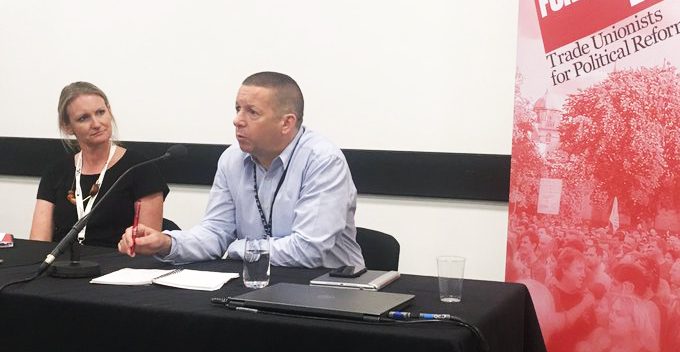
The prorogation saga has shown up Britain’s constitution for the undemocratic mess it is. And now trade unionists – there are over six million of them in the UK – are speaking up for a democratic overhaul.
At the ‘Politics for the Many’ fringe at TUC conference earlier this month, the Unite union’s Assistant General Secretary Howard Beckett made a powerful case for reform of Britain’s crumbling constitution – another sign unions are stepping up the push for political equality. Unite represent around 1.4 million workers in both public and private sectors.
Howard noted that the current ‘hard-right’ and hardline position of the government over Brexit is partly down to the way our Parliament (and government) is picked. The winner-takes-all voting system for choosing MPs means governing parties don’t have to think about all voters – only the bloc needed to get them ‘over the line’ in terms of seats. Johnson is currently trying to mobilise a core Leave coalition – and ignoring the rest.
In this scenario, we have to ask: what has Westminster’s battered voting system achieved for working people? The lesson of the past century is that it is a regressive force. “With each election we see our gains ripped away through the polarising force of winner-takes-all politics,” Howard said. That leads to a ‘see-saw effect’ in policy: one majority government stripping away the victories of the previous one.
The ‘majoritarian mindset’ means it doesn’t matter if we had three Labour governments: gains can just be scrapped by the next right-wing Conservative Party administration. Governments elected by proportional systems tend to be far more cooperative and bring in a diversity of voices – rather than leaving unions in the cold.
First Past the Post is an engine of extremism: with millions alienated through their votes being wasted, when a chance comes to be heard, people jump at it – as manifested in the Brexit result. The referendum was an opportunity for everyone to feel their vote really mattered – one vote was one vote.
In Scotland, First Past the Post buffered Labour with nearly all Parliamentary seats…until it didn’t. Support collapsed in what were thought of as ‘safe seats’, after they were seen as taking people’s votes for granted and not engaging any more.
“We have to accept that lots of people voted Leave because it was their opportunity to be heard,” says Howard – every vote counted equally, unlike we see in the ‘safe seats’ of Westminster elections. The iniquity of our voting system is shown by the fact that Labour needs to beat the Tories by 7.4% to get a majority – the Tories by just 4%.
It has slowed progress on the green agenda too – 1.2 million votes for the Green Party translated into one seat. That compares to 29,000 votes per DUP MP.
But how can we make change happen? A clear package has to be presented. Part of that has to be House of Lords abolition and replacement with a second chamber of the nations and regions, with voters guaranteed fair representation. While the Lords has held off some of the worst excesses of the government, it is similar in composition to how it might look under PR. Nor should occasional ‘wins’ for the left in the Lords override our principle: the system is undemocratic. “We should all start the discussion from the principled position of democracy,” says Howard.
Politics for the Many chair – and National Officer for the pro-PR PCS union – Lynn Henderson also made this point. The actions of the Lords at one time don’t make it a democratic forum: it is an unelected chamber of elites, hereditaries, and party appointees taking decisions on how this country is governed. A progressive overhaul should be the ‘Number 1’ demand of Corbyn government in the event of an election.
A reform agenda should also include votes for 16 and 17 year olds to include them in politics, and an update of our analogue-age campaign rules.
Lynn Henderson called for a constitutional convention to look at the detail of how to update our democracy.
One thing is clear: at the next election the trade union movement has to ‘mobilise at every opportunity’ for a real democracy – in the economy and in our institutions.
Sign up to Politics for the Many here: http://politicsforthemany.co.uk